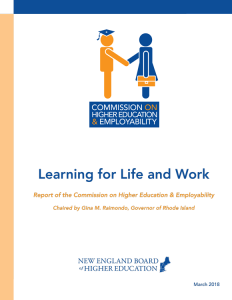NEBHE Regional Commission Issues Major Report and Recommendations on Higher Education and Employability
PROVIDENCE, R.I., March 19, 2018–The New England Board of Higher Education (NEBHE) Commission on Higher Education & Employability today released a major report with recommendations to increase the career readiness of graduates of New England colleges and universities and improve their transitions to work.
Click on the Report cover above to read and download the Report in PDF format.
Chaired by Rhode Island Gov. Gina M. Raimondo, the 50-member Commission invested 11 months in public meetings and working group sessions exploring New England employers’ concerns about a lack of qualified, skilled workers, particularly in rapidly changing, technology-intensive and growth-oriented industries. The challenge is exacerbated by a decline in the traditional working-age population in the New England states.
According to report findings, the vast majority of jobs in the region’s four fastest-growing fields will require a postsecondary degree by 2020, including 60% of healthcare support jobs, 93% of healthcare professional and technical jobs, 97% of STEM (science, technology, engineering and math) jobs, and fully 100 percent of social sciences jobs.
This report focused on the critically needed collaboration between higher education, employers and policymakers. The Commission recognized that shaping the workforce by developing active thinkers and lifelong learners is among several higher education missions that bolster New England’s economic competitiveness and quality of life.
In its report, “Learning for Life and Work,” the Commission offers a strategic action agenda with 18 key recommendations to align institutions, policymakers and employers. The Commission believes that all postsecondary students must have access to and demonstrate completion of critical employability-related experiences during their postsecondary education including:
- Foundational skills in literacy, numeracy and communication, including the ability to work in teams, communicate clearly orally and in writing, and solve problems
- An individual career plan prepared early in their postsecondary experience
- At least one paid and/or credit-bearing work-integrated learning experience
- Achievement of digital competencies related to their course of study, career goals and the fast-changing economy
- Attainment of an affordable credential that is employer-informed and is aligned to a career pathway
To meet this goal, the Commission calls on stakeholders to engage with its recommendations to:
- Participate in a strategic Digital Competencies Initiative aimed at expanding an institution’s capacity for innovative delivery of the digital knowledge, skills and competencies
- Invest in and elevate on campus, and through New England higher education accreditation standards, advising and career services as key priorities that improve not only graduate employability but also enrollment, retention and completion.
- Join the growing U.S. Multistate Longitudinal Data Exchange (MLDE) that tracks graduates’ post-graduation workforce outcomes, within and across states, to document through labor market data and intelligence the effectiveness of various programs
- Advocate for changes to federal student aid policies to increase funding for work-study and apply these funds to paid internships with qualified employers.
Gov. Raimondo said: “New England is world-renowned for its high-quality colleges and universities and the concentration of human talent that has fueled knowledge and innovation in our region and internationally. Governors and policymakers also consistently hear that, facing low population growth, increasing global competition and persistent equity gaps, New England employers are concerned about a lack of qualified, skilled workers. This concern is particularly acute for technology-intensive and growth-oriented industries.”
Nationally, research by Lumina Foundation has shown that while 96% of chief academic officers at higher education institutions say their institution is very or somewhat effective at preparing students for the world of work, only 11% of business leaders strongly agree that today’s college graduates have the skills and competencies that their business needs.
NEBHE President and CEO Michael K. Thomas said: “New England higher education institutions, along with their respective system, coordinating and governing boards, should make increased graduate employability a strategic priority—linked to institutions’ strategic plans, key outcomes, performance indicators and accountability measures. Throughout New England, states, public college and university systems, and individual institutions need to expand research, assessment and data systems, and self-audits to understand and document graduates’ employability-related outcomes.”
The “Learning for Life and Work” report was made possible through funding from the Strada Education Network, Lumina Foundation , and Nellie Mae Education Foundation.
Commission News
The Employability Imperative: A Pioneer in Job Guarantees Sweetens Offerings with Cybersecurity, Golf-Readiness
New England has a rich history of innovation and economic prosperity due, in part, to the fact that our region is home to some of the nation’s most prestigious higher… Read more »
The Rotary that Leads to Career Success for Graduates
Working in college career services, I see companies recognizing that the path from college to career has shifted from a one-way to a two-way street where employers and students can… Read more »
Commit to Building on New England’s “Employability” Advantage!
Higher education has provided New England with an economic advantage, as the region without strong natural resource advantages has relied on its higher education institutions (HEIs) and brainpower. A higher… Read more »




